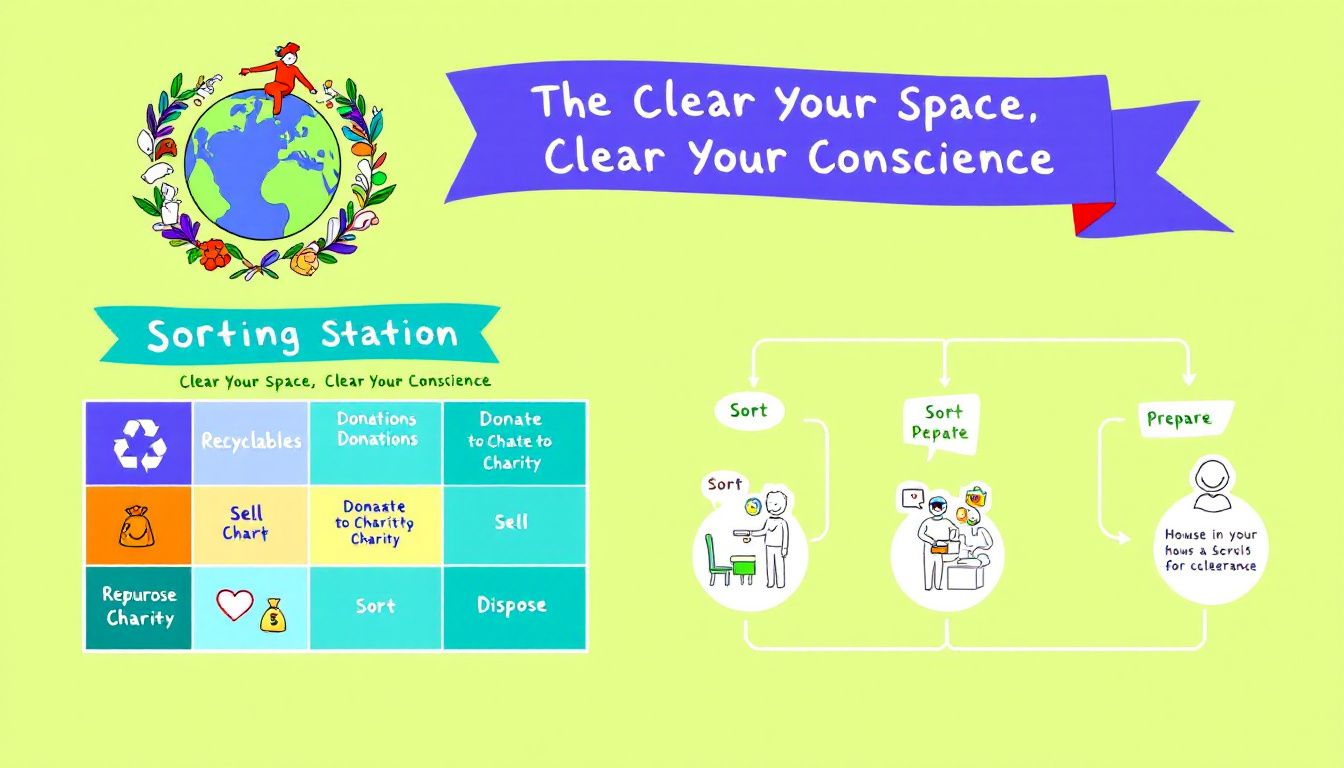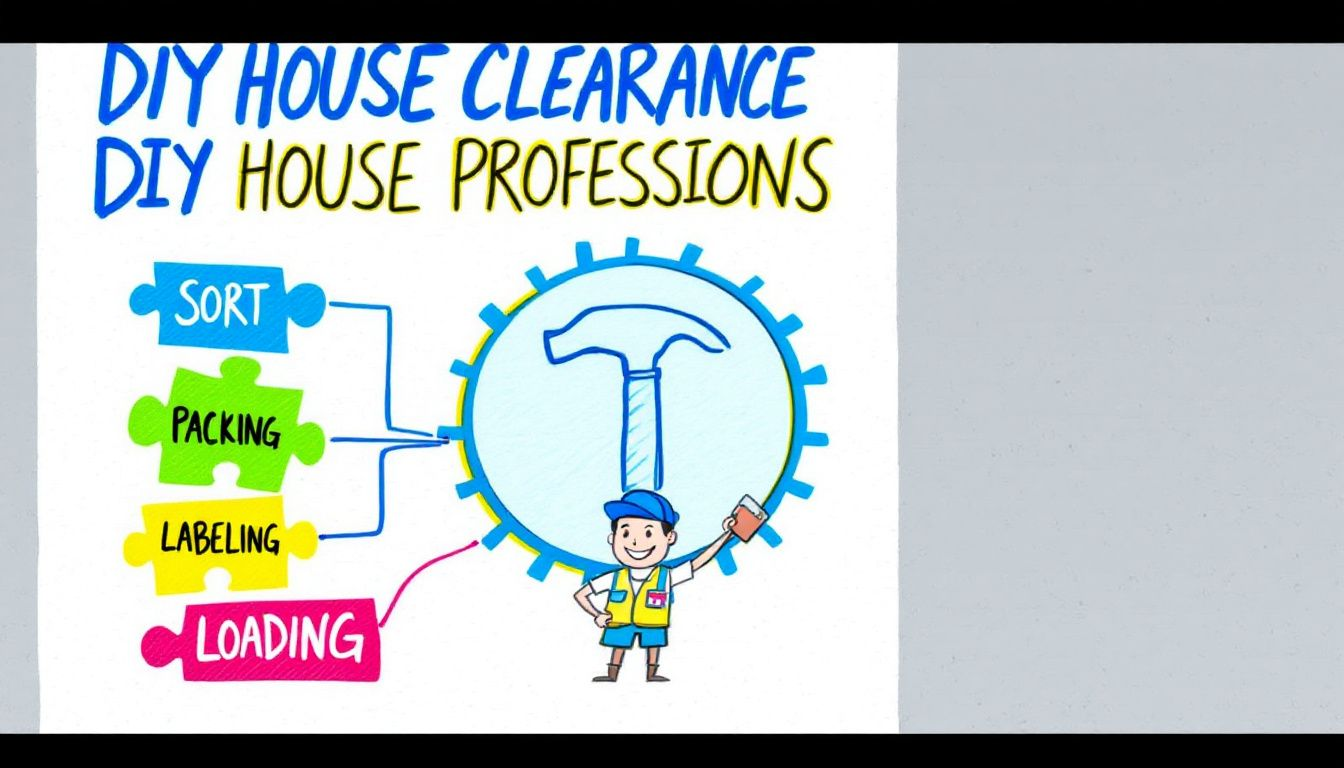
Key Takeaways
- House clearance costs for a three-bedroom house in the UK typically range from £750 to £1,100, influenced by factors like location, amount of waste, and additional disposal fees.
- Choosing a reputable house clearance company with proper licenses and insurance is crucial to ensure legal compliance and avoid hidden charges.
- Eco-friendly options such as recycling, donating, and thorough preparation before clearance can minimize environmental impact and help offset costs.
Understanding House Clearance Costs
The house clearance cost can significantly differ, and understanding what drives these expenses is crucial for effective financial planning. The size of the property, the volume of items to be cleared out, and geographical location are pivotal factors that dictate the overall expense. Larger properties demand more manpower and resources, which in turn escalates the total price associated with clearance. For example, a basic house clearance for a three-bedroom home in the UK typically falls between £170 and £200. Should there be an extensive quantity of rubbish or particularly challenging items to remove, prices may begin at approximately £400 upwards. It’s important to account for extra costs like labor charges, transportation costs, as well as disposal fees when calculating your budget. It is vital for homeowners to ensure their waste is handled legally and responsibly. Improper management could lead to penalties. Hence it’s essential to contract a reputable clearance company committed to adhering strictly to all legal requirements involved in waste removal operations.
Property Size
The clearance cost is heavily influenced by the size of your property, with larger properties demanding more time, effort, and resources to clear. This results in increased costs due to the extended duration needed for clearance and the greater amount of waste produced. For instance, clearing out a three-bedroom house will incur higher expenses compared to a smaller two-bedroom apartment due to its complexity and scale.
Amount of Waste
The volume of waste that needs removal is a significant determinant in the calculation of clearance costs. An increased quantity of household rubbish and various clearance items necessitates more transportation and resources, leading to higher expenses. Utilizing bigger skips also incurs greater costs due to their larger capacity for waste. Accurate estimation of the amount of household waste can assist in securing a reliable quote from clearance companies. Certain types of household waste may attract specific disposal fees. Disposing general home refuse typically comes at a lower expense compared to hazardous materials, which need specialized treatment and disposal techniques. Adhering to responsible methods when discarding waste not only supports environmental conservation, but also helps circumvent potential legal repercussions.
Location
The cost of house clearance is heavily influenced by the location, with urban settings, especially London, often resulting in greater charges due to increased costs of living and business operations. As an example, securing a skip permit in London can range from £10 to £70, demonstrating the heightened expenses associated with clearances in city areas. To rural locations, conducting house clearances within cities Incurs a steeper financial outlay.
Factors Affecting House Clearance Costs
House clearance costs can vary significantly depending on several factors. Understanding these factors can help you estimate the cost of your house clearance and make informed decisions when hiring a clearance company.
Average Cost to Clear a 3 Bedroom House

When planning a house clearance, it’s beneficial to have an understanding of the typical cost involved in clearing out a three-bedroom home within the UK. A large van load is often used as a reference point to explain the pricing structure associated with house clearance services. On average, such clearance costs can fluctuate between £750 and £1,100, excluding VAT. These estimates may alter depending on unique factors like the volume of items to be cleared and any extra services that might be necessary. It is also crucial to take into account regional cost differences when considering house clearance expenses. In regions like London and Southeast where living and business expenditures are steeper, you can expect higher clearance costs compared with other areas which might provide more economical options. Obtaining quotes from various localities is essential for comparison purposes.
London and Southeast
House clearance costs in London and the Southeast tend to be more expensive because of increased living expenses and business rates associated with these areas. For instance, the cost of clearing a three-bedroom house in London may reach approximately £750 plus VAT, illustrating how clearance companies have higher operational costs in these regions where living costs are elevated.
Other Regions
Conversely, the expense associated with house clearance in various parts of the UK, such as Scotland and northern England, is usually less prohibitive. The lower cost of living in these areas results in reduced fees for clearance services. For instance, initiating a house clearance for a three-bedroom residence within these regions can commence at around £600. It’s essential to factor in geographical location while planning financial allocations for house clearance costs.
Additional Fees and Expenses
The foundational expense of a house clearance can be considerable, and it is important to recognize that various additional costs may accumulate quickly. Skip hire costs can range from £70 to £400 depending on the size of the skip needed, offering flexibility to dispose of waste at your own pace. Electronics, mattresses, and sizable appliances typically attract supplementary disposal fees. The requirement for specialized methods to dispose of hazardous materials can also escalate the total cost. It is beneficial to comprehend these extra charges before engaging a clearance company in order not to encounter unexpected expenses and plan your finances more precisely. Should you choose self-conducted clearance efforts, take into account overlooked expenses such as packing supplies and transportation, which could diminish any savings you anticipated initially.
Disposal Fees
The cost of disposal fees can fluctuate widely depending on the items involved in a house clearance. Recycling electronic devices such as TVs may incur costs from £15 to £45, and getting rid of either a TV or monitor often comes with an extra fee, approximately £24 for each item. Mattresses also carry notable recycling expenses ranging between £60 and £80, with their individual disposal charges lying anywhere between £25 and £65. When it comes to disposing large appliances like fridges and freezers, one must be prepared for substantial fees. Getting rid of a small fridge or freezer typically amounts to around £60 per appliance. Disposing larger models might escalate the cost up to about £120. These considerable fees greatly influence the total expense associated with house clearance activities. Hence careful budgeting that takes these potential costs into account is crucial when planning a clearance operation.
Parking and Access
Issues with parking and access may impact the cost of house clearance. Challenges like restricted roads or numerous flights of stairs can extend the duration of the job and escalate labor costs. Securing a permit for a skip might incur an extra charge ranging from £10 to £70 based on your location, which would augment total clearance expenses. To reduce these additional costs, it is advisable to facilitate straightforward access and acquaint oneself with the necessary permit stipulations.
Labour Costs
When planning your budget for a house clearance, it’s important to take into account that labour costs form a substantial part of the total expense. The hourly charges for professionals involved in clearance work usually vary between £15 and £20, which fluctuates based on how complex the task is. Especially with larger or more intricate clearances, these costs can accumulate rapidly and are crucial to consider.
Choosing a Good House Clearance Company

Selecting a reputable house clearance service is crucial to ensure a smooth and legally compliant process. A good house clearance company will have the necessary licenses and insurance to operate legally and protect you from potential liabilities. This includes having a valid Environment Agency trash carrier’s license and sufficient insurance coverage. Verifying that the company can provide a waste transfer note as proof of proper waste disposal is important. Reading reviews and comparing several companies can help you identify the best service provider and avoid potential pitfalls.
Licensing and Insurance
It is crucial for the house clearance company you select to possess a legitimate waste carriers’ license and a valid waste collection registration number, as these are necessary for legal compliance in their operations. Ensuring that they have proper insurance coverage shields you from being held responsible should any mishaps or destruction occur while the clearance is underway. Such measures offer reassurance and guarantee that the work will be carried out with professionalism and safety at its core.
Reviews and References
When choosing a reputable clearance company, it’s crucial to consider reviews and references that specifically outline the services provided and their related expenses for them to be deemed trustworthy. Evaluating a variety of reviews can provide insight into the general efficiency and dependability of the clearance company.
Detailed Quotes
Receiving a detailed quote from a house clearance company ensures there are no concealed fees, providing transparency. It ought to include costs for labor, disposal, and any extra charges associated with particular services. Such thorough quoting facilitates precise budgeting and guarantees total tranquility throughout the process of clearance.
Eco-Friendly House Clearance Options

Many clearance companies now offer eco-friendly house clearance choices that considerably lessen the ecological footprint. These firms emphasize the importance of recycling and disposing of waste in a responsible manner, which aids in cutting down on landfill rubbish. Specialists in this field are adept at managing diverse types of items by ensuring they are disposed of or recycled following legal guidelines. Commercial Waste Removal services, along with recycling, giving away to charity, or reselling usable goods whenever feasible, constitute proper disposal methods. Such practices not only serve environmental purposes, but can also have financial advantages or contribute positively to community support. Opting for a company with a strong commitment to environmentally conscious protocols represents a conscientious decision for homeowners across Britain.
Recycling Services
Eco-conscious house clearances hinge on the effective recycling services provided by clearance companies. These firms play a significant role in minimizing the amount of household waste that ends up in landfills through proper disposal methods. It’s important to select clearance companies that have established transparent recycling protocols and collaborate with community charities, thus creating avenues for donating items when possible.
Donation and Resale
Providing items for donation or resale can help mitigate the expenses associated with house clearance while also benefiting the community. It is important to check with the local council for any regulations or permits required for house clearance activities. Various charitable organizations will often pick up items that have resale value at no charge, aiding in reducing waste and bolstering community assistance. Alternatively, utilizing auction houses to sell belongings can lead to monetary gains and assist in decluttering your residence during a clearance.
DIY House Clearance vs Hiring Professionals

Choosing to tackle house clearance on your own or enlisting the help of experts hinges upon your unique situation and requirements. Undertaking a DIY house clearance can be more economical and allows for a closer management of the endeavor. This route is time-consuming and labor-intensive, potentially necessitating extra tools such as dollies and skips. Conversely, employing professional services facilitates a swifter and streamlined experience, with the potential to finalize tasks within days rather than weeks. Although engaging professionals comes at an expense, it could alleviate stress and enhance productivity, particularly in complex scenarios.
Benefits of DIY
DIY house clearance offers several benefits, including cost savings and avoiding disposal fees for most domestic waste. Selling items at car boot sales or online can be more financially rewarding than hiring a clearance company. However, consider the additional clearance cost of hiring a van or skip and the time required to complete the clearance.
Professional Services
House clearance companies specialize in the efficient execution of the house clearance process, delivering both efficacy and tranquility. Skilled experts manage every aspect of the property clearance, from organizing items to their final disposal, freeing your time for other pressing responsibilities. Opting for a professional service guarantees an experience devoid of any complications. While these services do incur charges, they frequently prove cost-effective by diminishing expenses associated with waste removal and potentially enhancing the resale value through professionally sorted items.
Preparing for House Clearance
Ensuring a smooth house clearance begins with thorough preparation. Begin the process by deciding which possessions you wish to retain, give away, sell off or throw out. By organizing your belongings early on, you enhance the efficiency of the clearance task and prevent mistakenly losing items that hold monetary or emotional significance. Allocate ample time for this initial phase to circumvent any pressure. Maintaining clear lines of communication with your selected clearance company is crucial for success. It’s important that they are aware of specific timelines and have access to preliminary information about what needs clearing. Sharing images beforehand can be particularly helpful in facilitating their readiness. Properly managing these details ahead of time helps ensure a hitch-free day when it comes time for the actual clearance operation.
Sorting Items
Categorizing items into groups such as retain, give away, sell, and throw away can make the task of sorting easier. Thrift stores typically welcome donations of apparel, literature, and domestic items. For sizable furnishings and electronic goods, special planning may be required. To guarantee that no significant details are missed out on during your clear-out process, it is crucial to convey your disposal requirements with precision.
Labeling and Packing
Labeling boxes clearly is an essential practice that can eliminate ambiguity regarding their contents throughout the clearance process. This straightforward action plays a vital role in streamlining packing and guarantees quick recognition of items during sorting and disposal stages.
What to Expect During the Clearance Process
On the designated day of the clearance, a specialized team will conduct an evaluation of the property to verify which items are marked for disposal. This preliminary appraisal allows them to gauge both the quantity and category of objects to be removed, guaranteeing that they come equipped with all necessary tools and manpower. Such expert services expedite this process, often clearing out spaces within days rather than taking weeks. Following their initial assessment, removal operations commence with the crew meticulously handling each item for proper disposal in accordance with relevant regulations. A comprehensive examination follows once items have been cleared from space to assure complete removal as planned. This essential step confirms that no articles have been accidentally neglected or left behind during clearance efforts.
Arrival and Assessment
The team responsible for clearance reaches the property to start evaluating it for removal purposes. They inspect all items due for clearance, such as personal belongings, appliances, and furniture, in order to determine the necessary workforce and resources needed to complete the task.
Removal and Disposal
During the preparation for a house clearance, be aware that you might find a larger quantity of items than initially anticipated, potentially extending the duration needed to fully clear out the premises. The crew responsible will manage both the removal and disposal of these belongings, while upholding environmentally-friendly practices and adhering strictly to environmental laws.
Post-Clearance Considerations
Once the house clearance is completed, carrying out a thorough final inspection of the property to confirm that all items marked for disposal have been removed is vital. This practice helps avert unexpected surprises or added expenses following the completion of the clearance process. It’s essential to acquire and preserve crucial paperwork like waste transfer notes after clearing activities. These documents are not only legally mandatory to retain for at least two years as evidence of proper waste handling, but also ensure compliance with regulations. Documenting any contributions given to charity throughout the course of the house clearance may prove advantageous.
Final Walkthrough
The last walkthrough ensures that every item marked for removal has been effectively cleared out, letting you check that no significant elements have been missed and the property is prepared for its subsequent purpose.
Documentation
A waste transfer note acts as evidence of proper disposal and it is the duty of both entities participating in the transfer to verify its correctness. This important document should be retained for a minimum duration of two years. Similarly, maintaining documentation pertaining to donations made to charity can prove advantageous when needing to refer back at a later date.
Summary
The process of clearing out a three-bedroom house entails numerous expenses and considerations to be mindful of. These include the size of your property, the volume of waste, location specifics, and any unforeseen charges-all vital for effective financial planning. Engaging with a reputable clearance company ensures adherence to legal requirements while offering assurance throughout the operation. Choosing environmentally friendly disposal methods like recycling or donating items could be beneficial not only for nature but might also help in lowering overall costs. Whether tackling house clearance by yourself or employing professional services, each path presents its unique set of advantages and drawbacks. Making an informed decision is crucial based on personal needs and context. To wrap up, adequate preparation paired with a solid grasp on house clearance intricacies paves the way for smooth execution. By heeding advice laid out here within this guidebook framework, you’re well-equipped to handle what may seem overwhelming at first glance-transforming it into an achievable endeavor filled with satisfaction upon completion. Enjoy your clutter-free space!